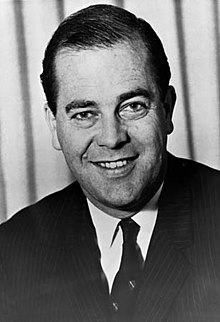Sir Phillip Lynch | |
|---|---|
 Lynch in 1969 | |
| Deputy Leader of the Liberal Party | |
| In office 20 December 1972 – 8 April 1982 | |
| Leader | Billy Snedden Malcolm Fraser |
| Preceded by | Billy Snedden |
| Succeeded by | John Howard |
| Treasurer of Australia | |
| In office 11 November 1975 – 19 November 1977 | |
| Prime Minister | Malcolm Fraser |
| Preceded by | Bill Hayden |
| Succeeded by | John Howard |
| Minister for Industry and Commerce | |
| In office 20 December 1977 – 11 October 1982 | |
| Prime Minister | Malcolm Fraser |
| Preceded by | Bob Cotton |
| Succeeded by | Andrew Peacock |
| Minister for Finance | |
| In office 7 December 1976 – 19 November 1977 | |
| Prime Minister | Malcolm Fraser |
| Preceded by | Position Established |
| Succeeded by | Eric Robinson |
| Minister for Labour and National Service | |
| In office 22 March 1971 – 5 December 1972 | |
| Prime Minister | William McMahon |
| Preceded by | Billy Snedden |
| Succeeded by | Lance Barnard |
| Minister for Immigration | |
| In office 12 November 1969 – 22 March 1971 | |
| Prime Minister | John Gorton William McMahon |
| Preceded by | Billy Snedden |
| Succeeded by | Jim Forbes |
| Minister for the Army | |
| In office 28 February 1968 – 12 November 1969 | |
| Prime Minister | John Gorton |
| Preceded by | Malcolm Fraser |
| Succeeded by | Andrew Peacock |
| Member of the Australian Parliament for Flinders | |
| In office 26 November 1966 – 22 October 1982 | |
| Preceded by | Robert Lindsay |
| Succeeded by | Peter Reith |
| Personal details | |
| Born | 27 July 1933 Carlton, Victoria, Australia |
| Died | 19 June 1984 (aged 50) Frankston, Victoria, Australia |
| Political party | Liberal |
| Spouse |
Leah O'Toole (m. 1958) |
Sir Phillip Reginald Lynch KCMG (27 July 1933 – 19 June 1984) was an Australian politician who served in the House of Representatives from 1966 to 1982. He was deputy leader of the Liberal Party from 1972 to 1982, and served as a government minister under three prime ministers.
Lynch was born in Melbourne and worked as a school teacher and management consultant before entering politics. He was elected to parliament at the 1966 federal election. Lynch was appointed to cabinet at the age of 34, and served as Minister for the Army (1968–1969), Minister for Immigration (1969–1971), and Minister for Labour and National Service (1971–1972) under John Gorton and William McMahon. He was elected deputy leader of the Liberal Party in 1972, serving first under Billy Snedden and later under Malcolm Fraser. Lynch became Treasurer when the Liberals returned to power in 1975, but had to resign after evidence at a judicial inquiry in Victoria by Sir Gregory Gowans linked him to land speculation in Victoria.[1] He was then Minister for Industry and Commerce until his retirement due to ill health in 1982. He died of cancer a few years later, aged 50.